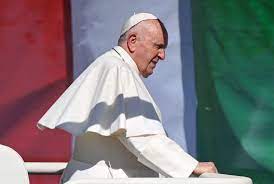In his message for the XXXII World Day of the Sick , which will be celebrated on February 11, 2024, the feast of the Virgin of Lourdes, Pope Francis encourages “the culture of tenderness and compassion to grow,” and remembers that “The sick, the frail, the poor are at the heart of the Church.”
The message was broadcast this January 13 by the Press Office of the Holy See, and has as its central point a biblical quote from Genesis: “It is not convenient for man to be alone.”
The Holy Father highlights that “from the beginning, God, who is love, created the human being for communion, inscribing the relational dimension in his being. Thus, our life, modeled in the image of the Trinity, is called to be fully realized in the dynamism of relationships, friendship and mutual love. “We were created to be together, not alone.”
“And it is precisely because this project of communion is inscribed in the depths of the human heart that the experience of abandonment and loneliness frightens us, is painful and even inhuman. And it is even more so in times of fragility, uncertainty and insecurity, often caused by the appearance of a serious illness,” he points out.
Pope Francis then remembers those who “were terribly alone during the Covid-19 pandemic; in the patients who could not receive visitors, but also in the nurses, doctors and support staff, overworked and locked in isolation rooms.”
“And obviously let’s not forget those who had to face the hour of death alone, only assisted by health personnel, but far from their own families,” he points out.
Addressing then the drama of “suffering and loneliness” caused by war, the Holy Father warns that this is “the most terrible of social illnesses,” and laments that “it is the most fragile people who pay the highest price.
However, he warns, “also in countries that enjoy peace and have greater resources, the time of old age and illness is often lived in loneliness and, sometimes, even in abandonment.”
Pope Francis then denounces that “this sad reality is a consequence above all of the culture of individualism, which exalts performance at all costs and cultivates the myth of efficiency, becoming indifferent and even ruthless when people no longer have the necessary strength to follow that rhythm.”
“Unfortunately, this logic also prevails in certain political options, which are not capable of putting the dignity of the human person and their needs at the center, and do not always favor the strategies and means necessary to guarantee the fundamental right to health and access to medical care for every human being.”
The Pope emphasizes that “the first care we need in illness is that of a closeness full of compassion and tenderness. Therefore, caring for the sick means, above all, caring for their relationships, all their relationships; with God, with others—family, friends, healthcare personnel—with creation and with oneself.”
“Let us remember this central truth of our lives, that we have come into the world because someone has welcomed us. We have been made for love, we are called to communion and fraternity. This dimension of our being sustains us in a particular way in times of illness and fragility, and is the first therapy that we must all adopt together to cure the diseases of the society in which we live.
“Let us heal the wounds of loneliness and isolation”
Pope Francis highlights that “in this changing era in which we live, we Christians are especially called to make the compassionate gaze of Jesus our own. Let us take care of those who suffer and are alone, and even marginalized and discarded.”
“With the reciprocal love that Christ the Lord gives us in prayer, especially in the Eucharist, let us heal the wounds of loneliness and isolation. Let us thus cooperate to counteract the culture of individualism, of indifference, of discarding, and let us grow the culture of tenderness and compassion,” he expresses.
“The sick, the frail, the poor are at the heart of the Church and must also be at the center of our human attention and pastoral concern. Let us not forget this”, encourages the Holy Father towards the end of his message.



